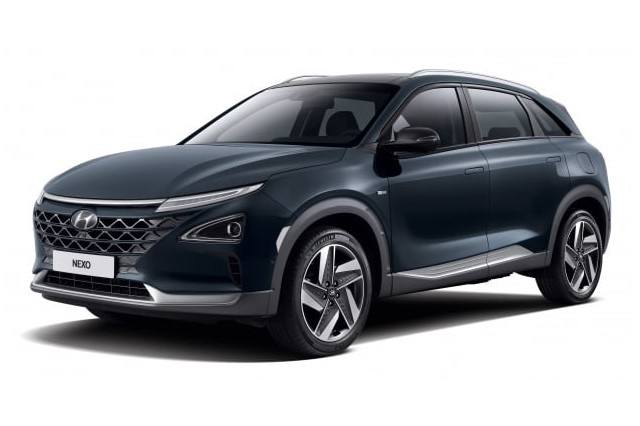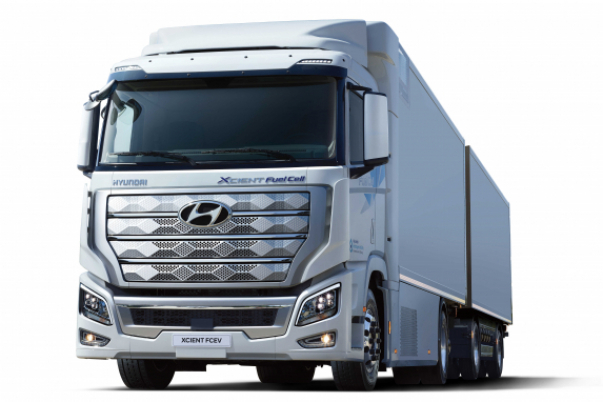Hyundai Motor to ramp up fuel cell car production
By Mar 02, 2021 (Gmt+09:00)
Samsung shifts to emergency mode with 6-day work week for executives


CJ CheilJedang to sell feed, livestock unit for $1.4 bn


Samsung Electronics' key M&A man returns; big deals in the offing


Affinity to buy SK Rent-a-Car at $572 mn, more deals expected


Keppel REIT to sell Seoul-based prime office T Tower



South Korea-based Hyundai Motor Co. has decided to produce around 17,000 units of its hydrogen fuel cell electric vehicle (FCEV) this year, thrice the volume from last year, due to the growing interest placed on hydrogen fuel cell cars at home and abroad.
Hyundai Motor recently chose to increase production of the Nexo, an FCEV sports utility vehicle, from 800 units to 1,500 units a month, according to the automobile industry on Mar. 1. The Nexo is made at the company's Ulsan Plant 5.
Hyundai Motor is aiming to increase domestic production of the Nexo from 5,500 units to 15,000 units this year, with exports growing from 900 units to 2,600 units.
Sales of the Nexo have climbed yearly since its launch in March 2018. Its sales rose from 727 units in 2018 to 5,786 units in 2020. As of October 2020, cumulative Nexo sales topped 10,000 units. Industry watchers say the company will be able to sell three years' worth of volume this year alone.
The surge in Nexo's popularity is largely owing to a word-of-mouth scheme, alongside an expanding charging infrastructure for hydrogen fuel cell vehicles.
In August, the company is also set to begin the mass production of fuel cell electric trucks, deemed as one of the company's future growth drivers. Last year, the automaker shipped around 50 XCIENT fuel cell trucks to Switzerland.

Hyundai Motor plans to begin production of its other eco-friendly vehicles this year. The company aims to produce around 168,000 electric vehicles and fuel cell cars from domestic plants, double the amount from the year-earlier period.
Next month, the Korean automaker will kick off the production of the electric version of the Genesis GV 80 model. Hyundai Motor aims to produce around 2,300 units annually.
In August, the company will also begin production of around 1,000 units of the GV 60, the first Genesis EV model to sit on the Electric-Global Modular Platform (E-GMP).
"One out of every 10 vehicles manufactured at Hyundai Motor's domestic plants will be an electric vehicle this year," said an automobile industry official. "Next year, the company's EV production may increase to around 30% once the Genesis EVs are officially sold on the market and IONIQ 6 is added to the portfolio," the official said.
Write to Byung-wook Do at dodo@hankyung.com
Danbee Lee edited this article.
-
 Hydrogen tie-upHyundai Motor, POSCO steelmaking tie-up to develop hydrogen tech
Hydrogen tie-upHyundai Motor, POSCO steelmaking tie-up to develop hydrogen techFeb 23, 2021 (Gmt+09:00)
2 Min read -
 Hydrogen tie-upHyundai Motor, POSCO tie up in hydrogen projects
Hydrogen tie-upHyundai Motor, POSCO tie up in hydrogen projectsFeb 16, 2021 (Gmt+09:00)
2 Min read -
 Fuel cell plantsHyundai inks deal to build first overseas hydrogen fuel cell plant in China
Fuel cell plantsHyundai inks deal to build first overseas hydrogen fuel cell plant in ChinaJan 15, 2021 (Gmt+09:00)
2 Min read -
 Fuel cell plantsHyundai Motor to build first overseas hydrogen fuel cell plant in China
Fuel cell plantsHyundai Motor to build first overseas hydrogen fuel cell plant in ChinaJan 05, 2021 (Gmt+09:00)
3 Min read -
 Hyundai Motor ships fuel cell system to non-automotive European startups
Hyundai Motor ships fuel cell system to non-automotive European startupsSep 16, 2020 (Gmt+09:00)
1 Min read


